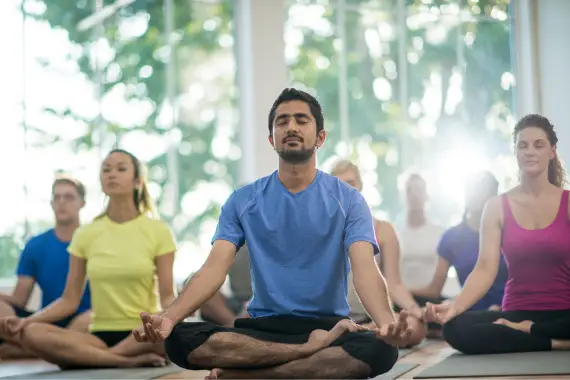What is meditation?
Meditation is a very ancient human integral science. This has been in practice for 5,000 years. This ancient wisdom is passed on from one practitioner to another in a direct one to one manner.
Nowadays, the word ‘meditation’ has become quite common and means different thingsN to different people. Because of its popularity and commonality, there is a lot of confusion and misconception about ‘meditation’. Therefore, to know what is not meditation is important.
When you hear the word ‘meditation’, the picture that immediately comes to your mind is yogis, mystical, himalayas, etc. You also get a feeling that to meditate you need to be a different and super human being not involved with or doing normal things that you do and lead a highly disciplined life giving up the pleasures of the world.
Let’s demystify meditation.
In order to meditate, first of all, you need not give up anything or acquire anything special or become beyond the ordinary. You can start meditating from where you are.
Meditation is not about becoming a different and super human with unparalleled spiritual powers and claiming dominance over others. In fact, spiritual powers are a block to progress in meditation.
Also, meditation should not be confused with concentration, contemplation, relaxation, hypnotism, auto-suggestion and the like. No doubt, concentration and contemplation are employed in meditation but they are not, per se, meditation.
Then, what is meditation?
The environment you will need to meditate in is your mind, in the beginning. As you grow deeper, you will experience a space within you that is untouched by the mind. That is the centre that you have to find and establish yourself in and that is the objective of meditation.
My humble suggestion is that you don’t need to research meditation, its methods, varieties, benefits etc. You just start meditating and all the knowledge that you seek, about yourself and about the world that you live in, will be revealed to you as a direct experience. The advantage of direct experience is that when you encounter it, you’ll be left with no doubt whatsoever and it gets imprinted in you even beyond the mind. From this, you can infer that meditation is a ‘direct experience’.
When you understand that meditation is not about ‘doing something’ but ‘doing nothing’, a genuine question may arise in your mind as to what exactly it means to stay doing nothing. This question cannot be answered in words but you can get the answer as a direct experience when you start meditating.
But remember, just because you don’t do anything during meditation, it doesn’t mean that meditation is a passive activity. It is a highly dynamic activity, the likes of which you would have never experienced in your life so far. In this context, meditation can be called ‘action without effort’ or ‘movement in stillness’.
Meditation is so dynamic and full of life that once you get a real taste of it, you won’t feel like opening your eyes for a long time. You’ll simply slip beyond time. What you will experience is ‘now’, the present moment, neither the past nor the future.
Meditation is present in you when you are awake and working, sleeping, dreaming and relaxing but you don’t know ‘how’ it is so. When you start meditating you’ll get a direct experience of this and your doubts will dissolve just like that. So, start meditating. Don’t worry. It is safe and you don’t need any background in yoga or spirituality to start meditating right away.
Given the present-day lifestyle, you cannot meditate for long hours and it is not required also. You’ll be wasting a lot of time in the name of meditation if you try so. Nothing concrete will emerge out of such practices and soon it’ll become mechanical and eventually you’ll give up meditation altogether.
Our mind is capable of making anything and everything mechanical. The challenge is to convert the mechanical into mindfulness. Meditation is not immune to this habit of the mind.
In conclusion, meditation is a path of self-knowledge and it is effortless. Self-knowledge is the highest knowledge that you can attain in this whole universe. The beauty is that just by understanding yourself, at all levels, you automatically understand everything that you see outside – the physical and the non-physical entities. Therefore, start meditating, if you haven’t already. If you are, then it’s time to go deeper.
Let’s meditate every day.
Why should you meditate?
It’s quite possible that you may be already meditating but still you may have some questions as to why you are meditating. On the contrary, you are yet to start meditating. In any case, let’s find out to get clarity.
One possibility for you to be still thinking about practising meditation may be due to any one or few of the following reasons:
- It’s a sacred practice. I’m not pure now and so not eligible to meditate.
- I’m a religious person and meditation will interfere with my god and faith.
- In order to meditate, I should give up pleasures and enjoyments and start leading an ascetic life.
- Meditation won’t fit into the lifestyle that I lead at present.
- I don’t have time to meditate.
- I’m scared to do meditation. Don’t know what will happen if I close my eyes.
- I don’t want to do a half-hearted job. I’ll first organise my life and then start the practice of meditation when I’m ready.
- There is no point in meditating because it won’t help me to deal with the problems and challenges in my life. It’s a waste of time.
- I don’t want to get stuck with a cult or misleading sect. I’m better off without it.
- Meditation is to be taken up and practised only when I grow old and little time left to live. That time is not now.
- My plate is already full. Meditation has no place in it.
- I’m still looking for an authentic technique and a genuine teacher.
The above list is just indicative and, by no means, exhaustive or complete.
Every human being is unique and so the reasons to do or not to do meditation can also be as many.
I’m not here to bust any of your reasons if you’re undecided about meditating. However, I consider it my duty to share with you the reasons for you to start meditating. Again, it is not going to be a complete list. Wish me luck !
I’ll list the top 3 reasons (according to me) for you to start meditating:
- Meditation influences all aspects of our life – the waking, dreaming, sleep and deep sleep states.
- When you start meditating, you’ll begin to participate in life fully and enjoy your life in the best way possible. Enrich your life by meditating everyday.
- When you meditate, you automatically meditate for others as well.
Let’s understand a bit more as to how meditation will positively influence your life.
You are nothing but an expression of energy – as a physical body, breathing being and thinking being with emotions. All are nothing but different expressions of energy just as the various light bulbs are nothing but the expression of electricity.
At present, since you don’t experience yourself as a body of energy due to poor sensitivity, you fail to notice the mis-alignment in the energy within you and outside you. Because of this mis-alignment in energy, you experience fear, anxiety and loneliness deep within. Since you are thoroughly busy during your waking state, you don’t realise that you keep yourself so busy to escape from fear, anxiety and loneliness. Unfortunately, by resorting to busy-ness, you cannot escape from the fundamental problem of fear and loneliness.
This is an alarming situation in all of us. You don’t have any clue as to how serious this problem is and if it is left unattended how it will lead to further complications. That is why it is time that you should start meditating, if not already.
When you begin to meditate, you’ll muster the stamina to stay with yourself and face your emotions – fear, anxiety and loneliness. I’ve singled out these three emotions from out of an ocean of emotions because fear is the source of all other disturbing emotions and is the root cause of all stress and insecurity. Meditation helps you to gather the strength to face your fears, fearlessly and with clarity and confidence. That’s why you should, without wasting time, start meditating right away, every day.
It has been proven through clinical research that the effect of meditation on the brain is ‘residual’ in nature, meaning, it is not only during the time of meditation that your brain gets impacted positively but even after meditation when you start going about your business as usual, the effect of the meditation stays the same way and with the same intensity in your brain. This means that if you do meditation for 2 minutes, the effect of that continues to manifest in you and whatever you do for the rest of the day.
The message here is that it is how deep you learn to meditate matters and not how long. It is the quality versus quantity. Daily practice is the only way out to attain quality in meditation.
I’m aware that you can’t get it on day one when you start meditating. That would be the wrong approach. Patience and practice are the two pathways that you need to create within yourself as a student of meditation. It won’t fail you. In my program, I’ll guide you with how you can establish yourself in meditation quickly when you sit. Though two weeks is not at all the desired time period to learn meditation, at the end of the program you will have a fairly good grip over your practice and you can start meditating without guidance, the correct way.
In order to impress upon you to start meditating, I’m not listing the countless neurological, physiological, and psychological benefits of meditation. A lot of research has been undertaken about the benefits of meditation and papers published to prove its efficacy. Please note that if you sit for meditation with expectations, the very expectation will block your progress in meditation.
Whether you like it or not, whether you want it or not, whether you know about it or not, the benefits of meditation will automatically accrue to you when you start meditating. It is a given thing.
By now, you might have understood the relevance and importance of meditating everyday and I’m positive that you won’t be looking anymore for reasons to start meditating.
Let’s meditate everyday.

